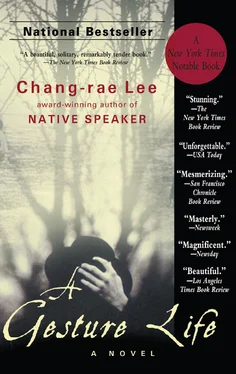FOR THE BETTER PART of the next four days our company was undisturbed, the whole of the infirmary standing empty. On those mornings I awoke especially early, finishing my camp-wide duties as soon as I was able, and by nine o’clock or so I could hurry back to my tent and get myself in decent order. With a washcloth I would swab my neck and underarms and feet and put on a clean shirt and trousers. I rubbed tooth powder along my gums and smoothed down my crewcut hair and set my cap on straight. I made sure to empty my pistol of bullets before placing it in the holster, which I would then attach to my belt. Then I would go to the officers’ mess and ask for a half-ration of cooked rice from the mess sergeant, who would nod and not say a word. When I reached the infirmary I’d wash my hands and then mix it with two rice balls I’d saved from my own meal the evening before and make them larger, dusting them with shrimp powder.
K seemed to like the pink-colored powder. Not the taste so much, I suppose, which was more salty than fishy, but the fact that I had taken the time to prepare the rice balls for her, form them into rounded wedges and brightly color one corner. When she looked at them set on the paper in my hands she said, with an acknowledging tone, “All they need now is sesame seeds.” So on the next day I took a pinchful from Sergeant Takagawa and carefully sprinkled it over the rice balls. When she saw what I had done she didn’t take them from me right away (as hungry as she was) but took my cupped hands and held them for what seemed many seconds. I wished then that I could have found some strips of dried fish for her, or a partridge egg, or anything more substantial, for she appeared quite thin to me, the bones of her shoulders seeming pronounced all of a sudden and her eyes darkly sunken in her face. In fact there was a full ration of food for her at Mrs. Matsui’s, but she had refused to eat in the days before she was sent to the commander’s hut, and it was only in the time with me that she finally began relenting before her hunger.
I watched her eat on those mornings. We didn’t talk much, but rather sat in the threshold of the closet door, like people waiting for something to happen. In the afternoons, I had to leave her and lock her inside the closet again for a couple of hours, in order to complete the rest of my non-medical responsibilities, and by the end of them I began to feel anxious, as though the dwindling of the day was not coming fast enough. I couldn’t help but picture her in the closet, barely two meters square, lightless save for the sunlight pushing through cracks in the wall, the heat blooming and redoubling in the tight space. But it was not her so much that made me uneasy. I felt as if my lungs and heart were detaching, moving outward to the skin, and that this was all too obvious to everyone I dealt with. As I was checking the state and condition of the mess hall and the latrines and supply dump, ordering men to clean and organize and raze (the secondary rounds of busywork in that long, odd probation from any fighting), I was almost certain that the soldiers were sensing my impatience and discomfort. They could not know, of course, the first thing about what Captain Ono had instituted, or my own increasing involvement, and yet I thought they kept meeting my gaze, not insubordinately but with a wonder and a host of questions. Who is the one we haven’t yet seen? What is he doing with her, there in the empty sick house? Has the poor medic actually fallen for her?
And what if he had? Would he have truly known it then anyway? It was nearly unimaginable, of course, to think such a relationship was possible, and yet in a strange way the doctor’s untoward interest in her, and his highly irregular orders, let me believe that my befriending her and showing her kindness and constantly thinking of her when she wasn’t present was almost ordinary. In fact, K admitted to me that she had not been menstruating some days before, that she had intentionally pricked her thumb with a wood splinter and smudged the blood around her private area and thighs, in the hope that the commander would reject her. Normally I could not have abided such information; and yet what was happening to me was so quick and sure, like one of the late autumn deluges that were sweeping in on us more and more often, the red-brown water suddenly ankle-deep, seeping in everywhere, and in the last minutes before I would go to her again I was practically trembling.
But it was really only toward dusk and evening that first day, when she was willing to talk with me, that I lost myself. I brought her some more rice, and after finishing she didn’t simply turn away and dwell in a corner until it was time for me to go. The daylight grew weak and dim and was almost gone, the exam room we were in becoming nearly dark. She asked again after my childhood and my families, the Ohs and the Kurohatas. To my surprise, she didn’t want to know only about my first parents; in fact, the Kurohatas seemed to intrigue her more. She was curious as to how they had treated me and raised me and if they loved me the way she was sure my birth parents must have loved me, even though they’d given me up.
I told her I believed the Kurohatas felt a strong bond with me, that they had provided me with every advantage and opportunity they could muster, a respectable house and schooling and outside lessons, and had always treated me like a son.
“But I was wondering if they love you like a son.”
“I think so. But I am not sure if there is a difference,” I said, “if they have always treated me like one.”
“I suppose not,” she said, her face hardly apparent to me in the darkness. I offered to light an oil lamp, but she wanted to keep the room dark. Then she said: “Have you always treated them like parents?”
“I can only hope I have,” I replied, instantly picturing them as they stood by their German sedan and waved to me as I boarded the troop ship at Shimonoseki. But I had not felt moved enough to cry, as did some of the other young men leaving home for the first time, even at the sight of my mother weeping fitfully into a kerchief. This is not so awful a farewell, was my thought, even if I am to die. I will miss them and feel sorry for them, and if I return I will be happy.
“You sound uncertain,” she said.
“I am only uncertain of my honoring of them, which I am always failing in. But that is a child’s lifelong burden.”
“Yes,” she replied, her voice a bit softer. “You’re probably right, Lieutenant. Even for those of us who would not wish it, like me, one of four unwanted daughters. Yet I know that if my father were to come to me tonight and ask me to wash his feet with the last drops of water I had I would not hesitate for a second.”
“You would be good to do so,” I said.
She didn’t answer immediately. All I could make out was the vaguest shape of her face.
“But he would never ask me such a thing,” she said. “He would hardly ever speak to me, you know, or to any of us girls. To him we were unaddressable, even before all the trouble that happened to our family. He might say, toward my mother or one of our servants, that I should fetch his slippers for him, or that I should be quieter, or go play outside. I didn’t sense hatred or bitterness from him. But what he had for me was mostly nothing at all, as if I were of the most distant blood. He touched me only once I can remember. A light hand touching my head, when my brother was born. I thought it would be the touch of a god.”
“Was it?”
“No,” she said. “It wasn’t. Not at all.”
“But he must have been pleased at the birth of your brother.”
“Of course he was. But they became so protective of him, he and my mother both. So in turn we were to be as well, the four of us girls.”
Читать дальше











![William Frith - John Leech, His Life and Work. Vol. 1 [of 2]](/books/747171/william-frith-john-leech-his-life-and-work-vol-thumb.webp)
![William Frith - John Leech, His Life and Work, Vol. 2 [of 2]](/books/748201/william-frith-john-leech-his-life-and-work-vol-thumb.webp)